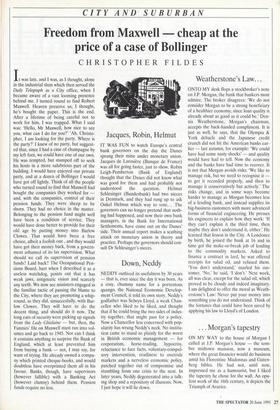Weatherstone's Law...
ONTO MY desk flops a stockbroker's note on J.P. Morgan, the bank that bankers most admire. The broker disagrees: 'We do not consider Morgan to be a strong beneficiary of a healthier economy, since loan quality is already about as good as it could be.' Den- nis Weatherstone, Morgan's chairman, accepts the back-handed compliment. It is just as well, he says, that the Olympia & York debacle and the Japanese credit crunch did not hit the American banks ear- lier — last autumn, for example: 'We could have had some nasty shocks' — and quality would have had to tell. Now the economy and the banks have had time to recover. It is not that Morgan avoids risks: 'We like to manage risk, but we need to recognise it — to get it recorded properly, and then to manage it conservatively but actively.' The risks change, and in some ways become harder to manage as Morgan becomes less of a lending bank, and instead supplies its big-business customers with more advanced forms of financial engineering. He presses his engineers to explain how they work: 'If they can't explain it the third time, then maybe they don't understand it, either.' He learned that lesson in the City. A Londoner by birth, he joined the bank at 16 and in time got the make-or-break job of lending to the commodity markets. Asked to finance a contract in lard, he was offered receipts for salad oil, and refused them. 'You don't understand,' snarled his cus- tomer. 'No,' he said, 'I don't.' Next week, all was clear, except for the salad oil, which proved to be cloudy and indeed imaginary. I am delighted to offer the moral as Weath- erstone's Law: Never put your money into something you do not understand. Think of the fortunes that could have been saved by applying his law to Lloyd's of London.


























































 Previous page
Previous page